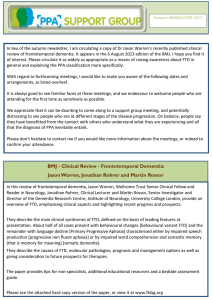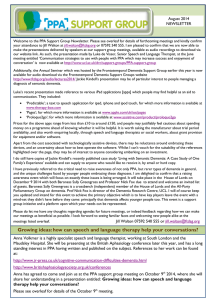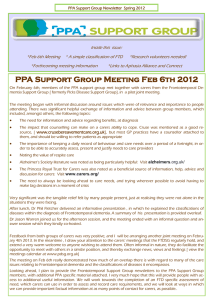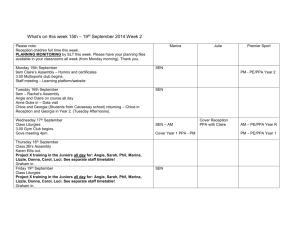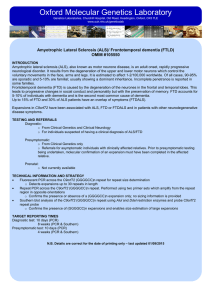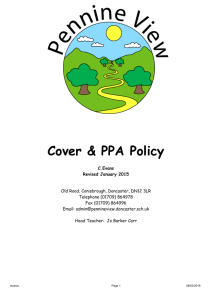NOVEMBER 22nd 2012 MEETING
advertisement
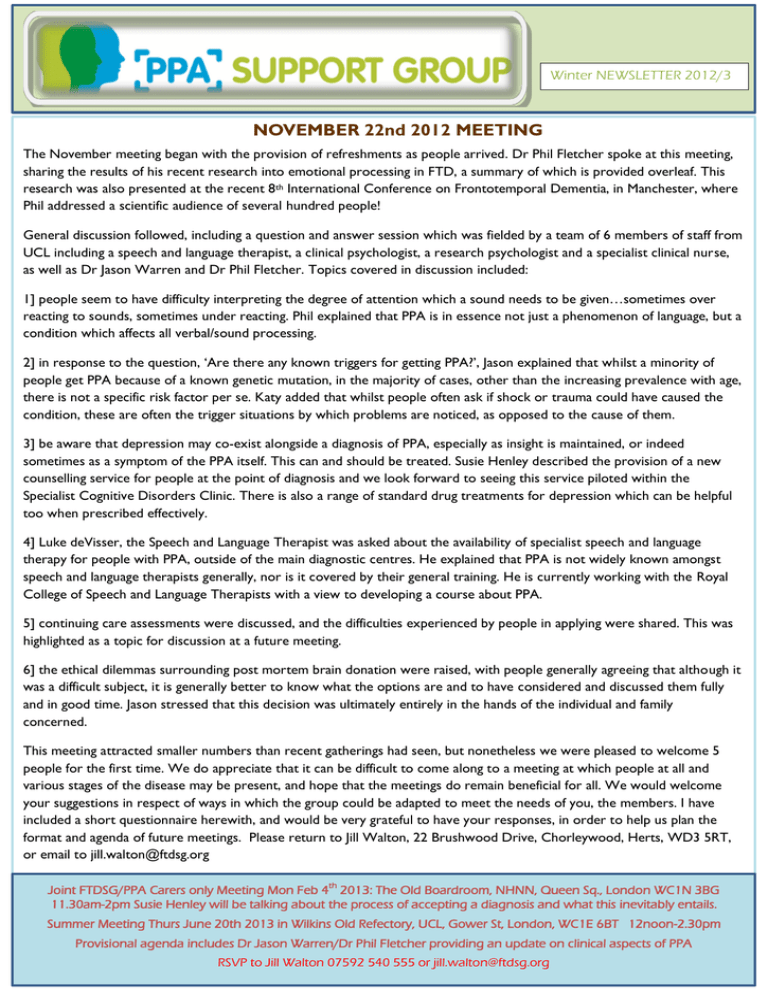
Winter NEWSLETTER 2012/3 NOVEMBER 22nd 2012 MEETING The November meeting began with the provision of refreshments as people arrived. Dr Phil Fletcher spoke at this meeting, sharing the results of his recent research into emotional processing in FTD, a summary of which is provided overleaf. This research was also presented at the recent 8th International Conference on Frontotemporal Dementia, in Manchester, where Phil addressed a scientific audience of several hundred people! General discussion followed, including a question and answer session which was fielded by a team of 6 members of staff from UCL including a speech and language therapist, a clinical psychologist, a research psychologist and a specialist clinical nurse, as well as Dr Jason Warren and Dr Phil Fletcher. Topics covered in discussion included: 1] people seem to have difficulty interpreting the degree of attention which a sound needs to be given…sometimes over reacting to sounds, sometimes under reacting. Phil explained that PPA is in essence not just a phenomenon of language, but a condition which affects all verbal/sound processing. 2] in response to the question, ‘Are there any known triggers for getting PPA?’, Jason explained that whilst a minority of people get PPA because of a known genetic mutation, in the majority of cases, other than the increasing prevalence with age, there is not a specific risk factor per se. Katy added that whilst people often ask if shock or trauma could have caused the condition, these are often the trigger situations by which problems are noticed, as opposed to the cause of them. 3] be aware that depression may co-exist alongside a diagnosis of PPA, especially as insight is maintained, or indeed sometimes as a symptom of the PPA itself. This can and should be treated. Susie Henley described the provision of a new counselling service for people at the point of diagnosis and we look forward to seeing this service piloted within the Specialist Cognitive Disorders Clinic. There is also a range of standard drug treatments for depression which can be helpful too when prescribed effectively. 4] Luke deVisser, the Speech and Language Therapist was asked about the availability of specialist speech and language therapy for people with PPA, outside of the main diagnostic centres. He explained that PPA is not widely known amongst speech and language therapists generally, nor is it covered by their general training. He is currently working with the Royal College of Speech and Language Therapists with a view to developing a course about PPA. 5] continuing care assessments were discussed, and the difficulties experienced by people in applying were shared. This was highlighted as a topic for discussion at a future meeting. 6] the ethical dilemmas surrounding post mortem brain donation were raised, with people generally agreeing that although it was a difficult subject, it is generally better to know what the options are and to have considered and discussed them fully and in good time. Jason stressed that this decision was ultimately entirely in the hands of the individual and family concerned. This meeting attracted smaller numbers than recent gatherings had seen, but nonetheless we were pleased to welcome 5 people for the first time. We do appreciate that it can be difficult to come along to a meeting at which people at all and various stages of the disease may be present, and hope that the meetings do remain beneficial for all. We would welcome your suggestions in respect of ways in which the group could be adapted to meet the needs of you, the members. I have included a short questionnaire herewith, and would be very grateful to have your responses, in order to help us plan the format and agenda of future meetings. Please return to Jill Walton, 22 Brushwood Drive, Chorleywood, Herts, WD3 5RT, or email to jill.walton@ftdsg.org Joint FTDSG/PPA Carers only Meeting Mon Feb 4th 2013: The Old Boardroom, NHNN, Queen Sq., London WC1N 3BG 11.30am-2pm Susie Henley will be talking about the process of accepting a diagnosis and what this inevitably entails. Summer Meeting Thurs June 20th 2013 in Wilkins Old Refectory, UCL, Gower St, London, WC1E 6BT 12noon-2.30pm Provisional agenda includes Dr Jason Warren/Dr Phil Fletcher providing an update on clinical aspects of PPA RSVP to Jill Walton 07592 540 555 or jill.walton@ftdsg.org Emotional Processing in Frontotemporal Dementia Luke With a funding grant from the Medical Research Council, Dr Phil Fletcher, Research Fellow at the Dementia Research Centre, UCL has recently been conducting some work investigating how processing of emotions may be affected in Frontotemporal dementia [FTD]. Many patients and their carers report that they notice changes in the emotional responses of people with FTD. It is possible that there are other more subtle deficits not noticed on a daily basis. It is currently unclear which levels of brain processing these problems lie within. For example, people may have alterations in their responses to emotional stimuli, i.e. how pleasant or unpleasant they find them, but may mount normal automatic physical responses (for example the increased heart rate when one visualises a fearful image). Alternatively, they may have problems with physically reacting to emotional stimuli. If we can detect changes in these parameters at early stages of disease processes, this may help us diagnose these diseases earlier and monitor their progress better, which is important for any future treatment trials. Dr Fletcher explained the details of this study at the meeting on Nov 22nd. . He described how he had conducted a small study in which participants were played an assortment of sounds across a range of ‘pleasantness’. Some sounds were rated as highly unpleasant [a child crying] whilst others at the opposite end of the scale were rated as highly pleasant [laughter]. There were many sounds that carried a pleasant/unpleasant rating between these 2 extremes. As each of the sounds was played to subjects, Dr Fletcher and the research team recorded the subject’s physical responses. In this case pupil dilatation was measured as a marker of how stimulating they found the sounds. The research team also looked at the topics personal ratings of how pleasant they found a sound by asking them to mark on a scale the’ ‘pleasantness’ of each sound they had heard immediately after hearing it. Dr Fletcher explains: ‘We compared healthy adults and patients with behavioural variant FTD, Semantic Dementia [SD], Progressive Non Fluent Aphasia [PNFA] and Alzheimer’s disease [AD]. We found that whilst healthy adults mounted a greater response for unpleasant and pleasant sounds compared to emotionally neutral sounds, all patient groups had a reduction in the degree to which they could physically respond to emotional sounds compared to neutral sounds. Furthermore, patients with SD and PNFA both had reduced ability to react to all sound types. Obviously within a group some people had normal responses and some had more abnormal responses. These results suggest that there may be core problems with the processing of emotional sounds in these diseases and that this may vary by disease type. As well as giving us more understanding of the fundamental disease processes we hope that by studying over time and extending this work we will develop new parameters by which to monitor progression.’ Dr Fletcher is keen to thank all the subjects and their carers who have helped with this work. International resources for people with PPA th At the 8 International Conference on Frontotemporal Dementia in September 2012, it was very encouraging to be amongst 600 delegates from over 35 countries, all with a vested interest in understanding frontotemporal dementia. Compare this to the 4 countries which were represented at the inaugural meeting in 1986, and we can see the rate at which interest in this field is growing. Whilst there is of course still a long way to go in respect of appreciating all that the various subtypes of FTD entail for patients and their families, we would like to draw your attention to 2 websites which may be of interest to you as we seek to understand more about the disease you are facing. The Association for Frontotemporal Dementia (AFTD) is a non-profit organization whose mission includes promoting and funding research into finding the cause, therapies and cures for frontotemporal degeneration, as well as providing information, education and support to persons diagnosed with an FTD disorder, and for their families and caregivers. They produce regular newsletters as well as case study patient profiles, one of which recently detailed the care pathway of a lady with PPA. For your information, this site is accessible at www.theaftd.org The second site of interest is an Australian one, which has recently produced a standalone ‘toolkit’ for FTD. Whilst focusing more on the behavioral than the language complexities it offers some really helpful advice and can be accessed via www.ecdc.org.au. These sites are in addition to the information you can find at the UK based www.ftdsg.org
